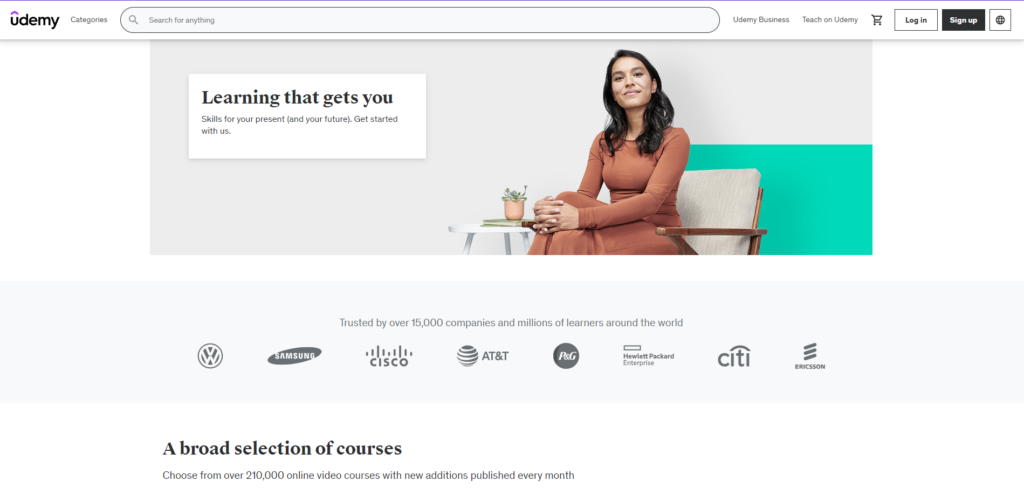Skillshare vs Udemy, the choice is daunting. This decision is crucial for both learners and creators alike. Skillshare and Udemy are two major players in this space, each offering unique features and benefits. In this comprehensive comparison, we’ll delve into the differences between Skillshare and Udemy, as well as some other alternatives from the perspectives of both learners and creators, helping you make an informed decision about which platform aligns best with your course goals in 2024.
Table of Contents
Skillshare: A Creative Community
Skillshare stands out as a vibrant and dynamic online learning community specifically crafted to cater to the needs of creators, freelancers, and individuals committed to lifelong learning. It offers thousands of classes across various categories, including illustration, design, photography, video, freelancing, and more. Unlike traditional online course platforms, Skillshare operates on a subscription-based model. This means that students pay a monthly fee for unlimited access to a diverse range of courses across various categories. This model offers students the flexibility to explore multiple courses without any additional costs, fostering a culture of continuous learning and exploration. Here’s a closer look at Skillshare’s key features:
- Subscription Model: Students pay a monthly fee for unlimited access to all courses.
- Community-Oriented: Skillshare fosters a tight-knit community of learners and creators.
- Project-Based Learning: Emphasis on hands-on projects to enhance learning engagement.
- Short, Digestible Classes: Courses are designed in short segments for easy consumption.

Pros of Skillshare
- Affordable for students with a low monthly fee.
- Strong community support and engagement.
- Ideal for creative and project-based courses.
Cons of Skillshare
- Limited focus on business, marketing, and technical topics.
- No accreditation or certificates for course completion.
Udemy: A Comprehensive Learning Marketplace
Udemy boasts the largest collection of online courses across a wide range of topics and interests, making it a go-to platform for learners seeking diverse educational opportunities. With over 210,000 online video courses available, Udemy stands out as a comprehensive marketplace for learning. Unlike Skillshare’s subscription-based model, Udemy operates on a pay-per-course basis, allowing students to purchase individual courses that align with their interests and learning objectives. Here are the key features of Udemy:
- Pay-Per-Course Model: Students purchase individual courses at varying prices.
- Extensive Course Categories: Courses available in diverse categories, appealing to a wide audience.
- Instructor Control: Instructors have more control over course pricing and content.
- Comprehensive Course Content: Courses can include quizzes, assignments, and downloadable resources.

Pros of Udemy
- Offers a variety of course content types, including quizzes and assignments.
- Broad reach and marketing support for course promotion.
- Greater income potential with flexible pricing options.
Cons of Udemy
- Higher competition due to the large number of courses.
- Quality control issues with varying course standards.
Skillshare vs Udemy: A Detailed Comparison

Course Setup and Creation
- Skillshare: Simple and quick course creation process with a focus on video content.
- Udemy: More comprehensive course setup with additional resources and content types.
Student Experience
- Skillshare: Ideal for students seeking short, creative classes with a community feel.
- Udemy: Appeals to students looking for in-depth courses with comprehensive content.
Pricing and Payment
- Skillshare: Subscription-based model with a flat fee for access to all courses.
- Udemy: Pay-per-course model with prices set by instructors, often ranging from free to $199.99.
Income Potential
- Skillshare: Revenue based on a royalty system tied to minutes watched by students.
- Udemy: Instructors earn based on course sales, with varying revenue share percentages.
Other Skillshare Alternatives or Sites like Udemy to Consider
While Skillshare and Udemy are popular choices, several other platforms cater to online learners and course creators:

Coursera:
- Student Perspective: Offers courses from universities and colleges, providing accreditation upon completion.
- Course Creator Perspective: Provides a platform for educators and institutions to reach a global audience with structured courses.
LinkedIn Learning:
- Student Perspective: Focuses on professional development with courses tailored to various industries.
- Course Creator Perspective: Allows course creators to reach professionals seeking continuous learning and skill development.
edX:
- Student Perspective: Offers a wide range of courses from universities and institutions around the world.
- Course Creator Perspective: Provides a platform for educators to create and deliver university-level courses.
Pluralsight:
- Student Perspective: Focuses on technology and IT-related courses, ideal for upskilling in these areas.
- Course Creator Perspective: Allows educators to create technical courses for a niche audience interested in technology.
Udacity:
- Student Perspective: Specializes in tech-related courses and nanodegree programs, offering hands-on projects and real-world skills.
- Course Creator Perspective: Provides a platform for industry professionals to create practical, job-ready courses in technology.
Teachable:
- Student Perspective: Hosts a variety of online courses on diverse topics, offering flexibility and convenience for learners.
- Course Creator Perspective: Provides tools for course creators to create and sell courses independently, offering control over pricing and branding.
Kajabi:
- Student Perspective: Offers courses on various topics, focusing on entrepreneurs and small businesses.
- Course Creator Perspective: Provides a platform for creating, marketing, and selling courses, with an emphasis on branding and customer engagement.
Conclusion : Udemy vs Skillshare

With Skillshare providing a vibrant community-focused platform with affordable access to creative and project-based courses, it lacks depth in business and technical topics, and does not offer certificates. Udemy, on the other hand, offers the largest course selection with a pay-per-course model, allowing for more comprehensive learning but facing challenges in quality control. Choosing between the two depends on individual preferences and goals, with Skillshare ideal for short, creative classes and community engagement, while Udemy suits those seeking in-depth courses and greater income potential. Additionally, alternative platforms like Coursera, LinkedIn Learning, edX, and others provide diverse options for learning and teaching across various subjects and industries, catering to a wide range of preferences and needs in the online learning space.
Take the Next Step: Your Path to Learning and Growth
Ready to take the next step in your online learning journey? Explore Skillshare and Udemy to find the perfect courses for your interests and goals. Also, consider reading my blog post on “6 Life-Changing Benefits of Online Learning” to discover more about the advantages of online education. Whether you’re looking for creative inspiration, professional development, or simply want to expand your knowledge, these platforms offer a wealth of resources to help you succeed. Don’t wait any longer—start learning today!





